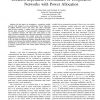Free Online Productivity Tools
i2Speak
i2Symbol
i2OCR
iTex2Img
iWeb2Print
iWeb2Shot
i2Type
iPdf2Split
iPdf2Merge
i2Bopomofo
i2Arabic
i2Style
i2Image
i2PDF
iLatex2Rtf
Sci2ools
ISCC
2009
IEEE
2009
IEEE
Location-dependent performance of cooperative networks with power allocation
—In this paper we investigate a cooperative mobile network with respect to error performance. Power allocation is applied between source and relay. The relay cooperates after having received a request from the destination which decides upon successful or non-successful transmission based on a threshold criterion. We show that with respect to the relay’s location a suitable power allocation technique can increase performance enormously. Our results reveal that a practical implementation strategy for cooperative networks first proposed in [1] can easily be adopted to cognitive networks where a relay senses its environment for feedback signals from the destination. Depending on the applied services, however, it may be beneficial to always cooperate, since this creates spatial diversity at the destination.
Related Content
| Added | 21 May 2010 |
| Updated | 21 May 2010 |
| Type | Conference |
| Year | 2009 |
| Where | ISCC |
| Authors | Tobias Renk, Friedrich Jondral |
Comments (0)

